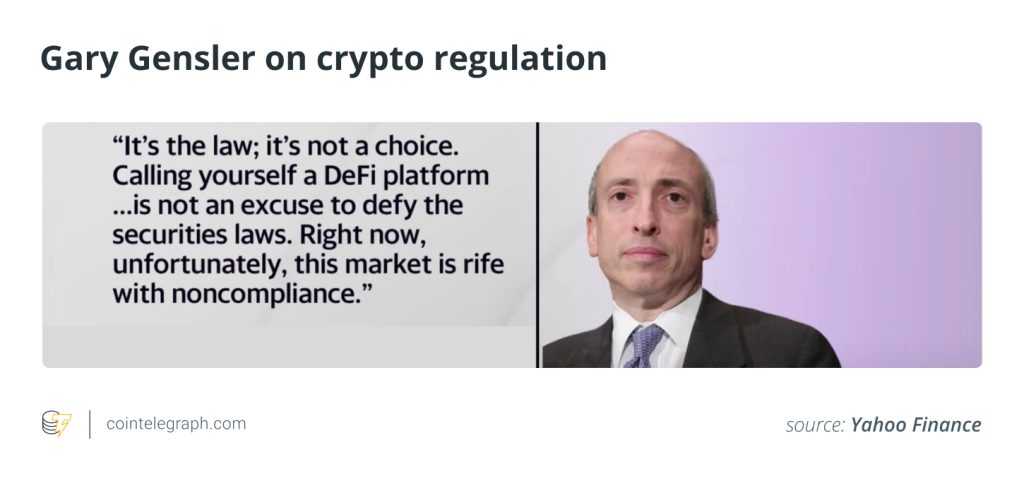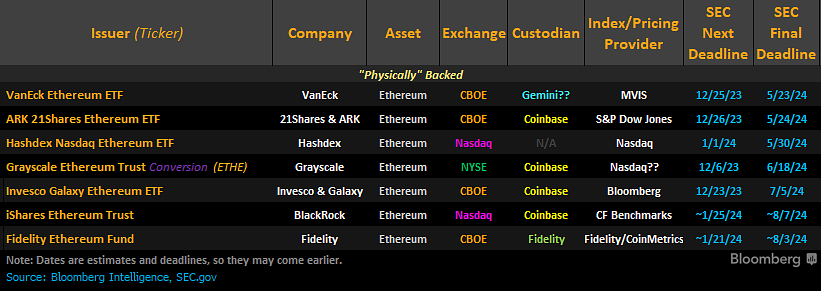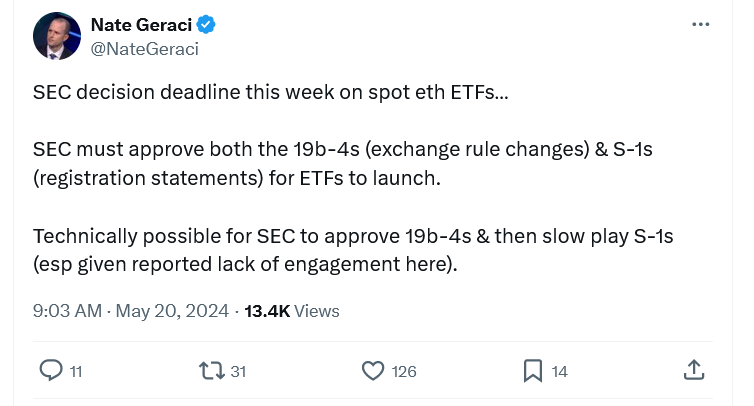Gary Gensler had the opportunity to stop a spot Bitcoin ETF, so why didn’t he?

Many speculated that the SEC chair had no choice but to approve the investment vehicle after a court-ordered review of Grayscale’s spot Bitcoin ETF application.

On Jan. 10, after a false start the day prior, the United States Securities and Exchange Commission under Chair Gary Gensler gave the green light to a spot Bitcoin (BTC) exchange-traded fund (ETF) for the first time.
The decision by the SEC to approve a spot cryptocurrency investment vehicle for the first time raised questions about Gensler’s intentions. Since taking office, the SEC chair has often spoken about the risks of crypto investments, connecting digital assets to fraud and scams.
Yet, when the SEC held a vote to decide on a spot Bitcoin ETF, Gensler was one of three commissioners who voted to approve the offerings. Commissioners Hester Peirce and Mark Uyeda voted in favor of the ETF alongside Gensler, while Caroline Crenshaw and Jaime Lizárraga dissented.
The 3-2 tally suggested that the SEC chair may have been the deciding vote. In a Jan. 10 statement following the public learning about the historic approval, Gensler continued his narrative of being largely critical of crypto, calling BTC a “speculative, volatile asset” and saying the commission did not “approve or endorse” Bitcoin despite the ETF approval.
Great to see the spot #Bitcoin ETFs finally get the green-light from the SEC
Was anyone secretly worried Gary Gensler might've pulled the plug after yesterday's debacle? pic.twitter.com/sYO69SF9wk
— Cointelegraph (@Cointelegraph) January 10, 2024
Cointelegraph reached out to Gensler’s office but did not receive a response at the time of publication. Some online suggested that the SEC chair “voted with Wall Street,” as the expansion of crypto products was likely to bring in investor funds. Others speculated that “the writing was already on the wall” for the SEC to approve a spot Bitcoin ETF, given the commission had been issued a mandate by a federal court to review Grayscale’s offering.
Related: Critics lash out at ‘unsound’ and ‘ahistorical’ spot Bitcoin ETF approval
Grayscale won its appeal in August, with the court saying the SEC had been “arbitrary and capricious” in denying the asset manager’s ETF application. This ruling suggested that should the SEC have decided to reject a spot Bitcoin ETF after the court decision, it would need to do so for different reasons — i.e., not claiming the risks of market manipulation and investor protection.
“It would have been simpler, quicker and much less painful had Chair Gensler approved an ETF years ago, rather than being essentially compelled to do so by court order,” Blockchain Association CEO Kristin Smith told Cointelegraph. “Consumer demand for this accessible product has been obvious and, as the chair likes to cite, those consumers could benefit from a judicious and watchful regulator. While delayed, the approval of the ETF is a welcome turnaround from the SEC.”
As much hate as Gensler received leading up to ETF vote, at the end of the day you have to give him credit that he did the right thing https://t.co/m8ikf1xucP
— WhiteBelt (@WhiteBeltCrypto) January 11, 2024
Representatives Patrick McHenry and French Hill of the House Financial Services Committee said the SEC decision was a “significant improvement” over the commission’s regulation by enforcement approach to crypto. It’s unclear how the ETF approval could affect ongoing lawsuits by the SEC against crypto firms, including Ripple, Coinbase, Kraken and Binance. In those cases, the commission claimed that many cryptocurrencies are considered unregistered securities.






… [Trackback]
[…] Here you will find 80550 more Info to that Topic: x.superex.com/news/bitcoin/2343/ […]
… [Trackback]
[…] Find More to that Topic: x.superex.com/news/bitcoin/2343/ […]
… [Trackback]
[…] Find More here to that Topic: x.superex.com/news/bitcoin/2343/ […]
… [Trackback]
[…] Find More to that Topic: x.superex.com/news/bitcoin/2343/ […]
… [Trackback]
[…] There you can find 70565 more Information on that Topic: x.superex.com/news/bitcoin/2343/ […]
… [Trackback]
[…] Info to that Topic: x.superex.com/news/bitcoin/2343/ […]
… [Trackback]
[…] Information to that Topic: x.superex.com/news/bitcoin/2343/ […]
… [Trackback]
[…] Read More Information here to that Topic: x.superex.com/news/bitcoin/2343/ […]
… [Trackback]
[…] Find More Info here to that Topic: x.superex.com/news/bitcoin/2343/ […]
… [Trackback]
[…] Here you will find 51940 more Information to that Topic: x.superex.com/news/bitcoin/2343/ […]
… [Trackback]
[…] Read More Info here on that Topic: x.superex.com/news/bitcoin/2343/ […]
… [Trackback]
[…] Information on that Topic: x.superex.com/news/bitcoin/2343/ […]
… [Trackback]
[…] Find More on to that Topic: x.superex.com/news/bitcoin/2343/ […]
… [Trackback]
[…] Read More Info here on that Topic: x.superex.com/news/bitcoin/2343/ […]
… [Trackback]
[…] Information on that Topic: x.superex.com/news/bitcoin/2343/ […]
… [Trackback]
[…] Find More to that Topic: x.superex.com/news/bitcoin/2343/ […]
… [Trackback]
[…] Info to that Topic: x.superex.com/news/bitcoin/2343/ […]
… [Trackback]
[…] Info to that Topic: x.superex.com/news/bitcoin/2343/ […]
… [Trackback]
[…] There you will find 52587 additional Info on that Topic: x.superex.com/news/bitcoin/2343/ […]
… [Trackback]
[…] Read More here on that Topic: x.superex.com/news/bitcoin/2343/ […]
… [Trackback]
[…] Find More here to that Topic: x.superex.com/news/bitcoin/2343/ […]
… [Trackback]
[…] Read More on on that Topic: x.superex.com/news/bitcoin/2343/ […]
… [Trackback]
[…] Info to that Topic: x.superex.com/news/bitcoin/2343/ […]
… [Trackback]
[…] There you can find 12468 more Info on that Topic: x.superex.com/news/bitcoin/2343/ […]
… [Trackback]
[…] Read More on that Topic: x.superex.com/news/bitcoin/2343/ […]
… [Trackback]
[…] Find More Information here on that Topic: x.superex.com/news/bitcoin/2343/ […]
… [Trackback]
[…] Read More Info here to that Topic: x.superex.com/news/bitcoin/2343/ […]